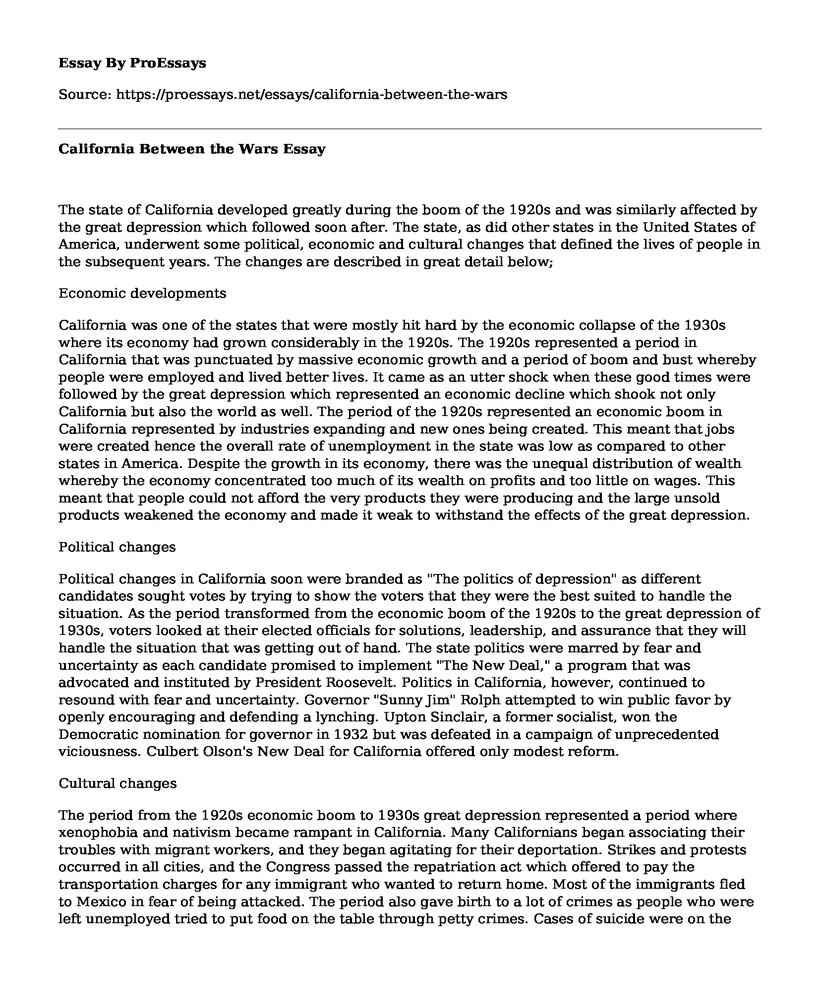The state of California developed greatly during the boom of the 1920s and was similarly affected by the great depression which followed soon after. The state, as did other states in the United States of America, underwent some political, economic and cultural changes that defined the lives of people in the subsequent years. The changes are described in great detail below;
Economic developments
California was one of the states that were mostly hit hard by the economic collapse of the 1930s where its economy had grown considerably in the 1920s. The 1920s represented a period in California that was punctuated by massive economic growth and a period of boom and bust whereby people were employed and lived better lives. It came as an utter shock when these good times were followed by the great depression which represented an economic decline which shook not only California but also the world as well. The period of the 1920s represented an economic boom in California represented by industries expanding and new ones being created. This meant that jobs were created hence the overall rate of unemployment in the state was low as compared to other states in America. Despite the growth in its economy, there was the unequal distribution of wealth whereby the economy concentrated too much of its wealth on profits and too little on wages. This meant that people could not afford the very products they were producing and the large unsold products weakened the economy and made it weak to withstand the effects of the great depression.
Political changes
Political changes in California soon were branded as "The politics of depression" as different candidates sought votes by trying to show the voters that they were the best suited to handle the situation. As the period transformed from the economic boom of the 1920s to the great depression of 1930s, voters looked at their elected officials for solutions, leadership, and assurance that they will handle the situation that was getting out of hand. The state politics were marred by fear and uncertainty as each candidate promised to implement "The New Deal," a program that was advocated and instituted by President Roosevelt. Politics in California, however, continued to resound with fear and uncertainty. Governor "Sunny Jim" Rolph attempted to win public favor by openly encouraging and defending a lynching. Upton Sinclair, a former socialist, won the Democratic nomination for governor in 1932 but was defeated in a campaign of unprecedented viciousness. Culbert Olson's New Deal for California offered only modest reform.
Cultural changes
The period from the 1920s economic boom to 1930s great depression represented a period where xenophobia and nativism became rampant in California. Many Californians began associating their troubles with migrant workers, and they began agitating for their deportation. Strikes and protests occurred in all cities, and the Congress passed the repatriation act which offered to pay the transportation charges for any immigrant who wanted to return home. Most of the immigrants fled to Mexico in fear of being attacked. The period also gave birth to a lot of crimes as people who were left unemployed tried to put food on the table through petty crimes. Cases of suicide were on the increases as the number of people engaging in alcoholism to find an escape. Women in Californian cities engaged in prostitution as a way of paying bills.
Cite this page
California Between the Wars. (2021, May 14). Retrieved from https://proessays.net/essays/california-between-the-wars
If you are the original author of this essay and no longer wish to have it published on the ProEssays website, please click below to request its removal:
- The History of Ancient Geology
- The Birth of a Nation Annotated Bibliography
- Paper Example on the Art of War by Sun Tzu: The United States Military History
- Political Causes of American Civil War Essay Example
- Paper Example on 19th Century America: Shift to Democracy & Industrialization
- Women's History: From Abigail Adams to Hillary Clinton - Essay Example
- Thomas Graham: Pioneering Chemistry through Graham's Law of Diffusion and Scientific Contributions - Free Paper







